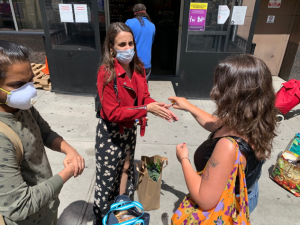
During these uncertain times, we have all had to adapt how we do our day-to-day activities and how we are being in our lives. This adaptation can be reactionary—changing how we do things without intention or awareness. Or the shifts we make can be intentional—responding to our changing circumstances by seeking and choosing the opportunities (i.e., the “probletunities”) presented by each challenge.
Our reason for being here at the Wallace Stegner Center’s Environmental Dispute Resolution (EDR) program is to promote a culture of collaboration in Utah, the Mountain West region and more broadly. Professor Edgar Schein of MIT defined culture as the interaction of habits, values, and beliefs co-evolving over time. We attend to cultures of collaboration through teaching, researching, and modeling collaboration skills; convening and facilitating what Don Snow referred to as “coalitions of the unalike” to generate mutual gains and value-creating solutions for complex public policy issues. We also serve as impartial collaboration coaches and guides on the side. As the coronavirus pandemic heads into months 3, 4, and 5, we are doing our best to seize the opportunities in every challenge and intentionally adapt, adapt, and adapt—especially in the realm of co-learning and collaborating in virtual spaces.
One “probletunity” we see in the current moment is a forced reminder to slow down, notice, reflect, and intentionally choose our ways of being. Now is a time to lean into and really practice what Mike Wheeler refers to in his wonderful book The Art of Negotiation as “situational awareness”: to observe, orient, decide, and act. To encourage this kind of situation awareness, intentionality, and learning among our community, we ask readers to reflect on: what is the coronavirus, which we have taken to referring to as Madame C, teaching you?
Get notified when new articles are posted to the EDR blog. Sign up for our email list »
We would love to hear and share your thoughts about the lessons you are learning from Madame C via a 200-800 word written reflection. We will share these reflections individually or in batches via the EDR Blog to help foster a community of learning.
Here are some questions to consider, and, if you are willing, to share your thoughts about:
- What is this coronavirus pandemic causing you to notice about your day-to-day existence, especially as it pertains to collaboration, dialogue, and leadership?
- What seems possible now?
- How are you collaborating with yourself? Are you “listening empathetically for your underlying needs, just as you would with a valued partner or client” (to use the words of William Ury from the highly recommended book Getting to Yes with Yourself)? If so, what is that telling you?
- What challenges you are facing right now, and what opportunities might be present in those challenges?
- How is the virus helping or hindering your collaborative work? How are you reacting or responding to hinderances?
- What tools, resources, and approaches are you experimenting with or finding helpful for supporting collaboration and social connection amid these physically distanced times?
- What lessons are you learning about collaboration, dialogue, and leadership—or just about thriving amid change and uncertainty—that others might benefit from?
Please send your reflections to Angela Turnbow by August 15, 2020 (or sooner)! We look forward to reading and sharing the insights you send us.
Thank you!
 Nedra Chandler is the associate director of the Environmental Dispute Resolution (EDR) program at the Wallace Stegner Center, S.J. Quinney College of Law, University of Utah. She is an experienced credentialed coach for individuals, teams, and intergovernmental work.
Nedra Chandler is the associate director of the Environmental Dispute Resolution (EDR) program at the Wallace Stegner Center, S.J. Quinney College of Law, University of Utah. She is an experienced credentialed coach for individuals, teams, and intergovernmental work.
 Danya Rumore, Ph.D., is the director of the Environmental Dispute Resolution program in the Wallace Stegner Center at the University of Utah. She is a research associate professor in the S.J. Quinney College of Law and a research assistant professor in the City and Metropolitan Planning Department at the University of Utah’s. She teaches about, practices, and conducts research on negotiation, dispute resolution, leadership, and collaborative problem solving.
Danya Rumore, Ph.D., is the director of the Environmental Dispute Resolution program in the Wallace Stegner Center at the University of Utah. She is a research associate professor in the S.J. Quinney College of Law and a research assistant professor in the City and Metropolitan Planning Department at the University of Utah’s. She teaches about, practices, and conducts research on negotiation, dispute resolution, leadership, and collaborative problem solving.
